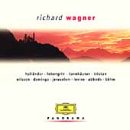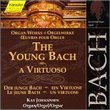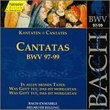| All Artists: Richard [Classical] Wagner, Karl Böhm, Claudio Abbado, Giuseppe Sinopoli, Eugen Jochum, James Levine, Bayreuth Festival Orchestra, Vienna Philharmonic Orchestra, Philharmonia Orchestra of London, Philharmonia Orchestra, Berlin State Opera Orchestra, Metropolitan Opera Orchestra, Gwyneth Jones, Kurt Moll, Cheryl Studer, Siegfried Jerusalem, Dietrich Fischer-Dieskau, Roberto Banuelas, Plácido Domingo, Gerd Feldhoff Title: Panorama (Highlights from der fliegende Hollander, Lohengrin, Tannhauser, Die Meistersinger von Nurnberg, Parsifal, Tristan und Isolde) Members Wishing: 0 Total Copies: 2 Label: Deutsche Grammophon Release Date: 10/17/2000 Genre: Classical Styles: Opera & Classical Vocal, Historical Periods, Modern, 20th, & 21st Century, Symphonies Number of Discs: 2 SwapaCD Credits: 2 UPCs: 028946922620, 002894692262 |
Search - Richard [Classical] Wagner, Karl Böhm, Claudio Abbado :: Panorama (Highlights from der fliegende Hollander, Lohengrin, Tannhauser, Die Meistersinger von Nurnberg, Parsifal, Tristan und Isolde)
CD DetailsSimilar CDs
|
CD ReviewsGood introduction, good value David A. Kemp | Plano, TX USA | 10/04/2001 (4 out of 5 stars) "This is a sensible, cost-effective way to gain a nodding if superficial acquaintance with Wagner's six most important non-Ring operas. (The four Ring operas are similarly if somewhat more generously highlighted, in the Karajan/Berlin Philharmonic recordings, on a 2-CD Deutsche Grammophon set that is a companion volume to this one, so if you buy both sets--4 CDs--you gain at least some exposure to all ten major Wagner operas.) CD 1 of this set (64'22 in length) gives you 21'04 of Der fliegende Hollander (The Flying Dutchman), in the Karl Bohm/Bayreuth recording (1972); 21'25 of Lohengrin, in the Claudio Abbado/Vienna Philharmonic recording (1994); and 21'53 of Tannhauser, in the Giuseppe Sinopoli/Philharmonia recording (1989). CD 2 (70'55 in length) gives you 23'15 of Die Meistersinger von Nurnberg, in the Eugen Jochum/Deutschen Oper Berlin recording (1976); 25'50 of Parsifal, in the James Levine/Metropolitan Opera recording (1994); and 21'18 of Tristan und Isolde, in the Karl Bohm/Bayreuth recording (1966). All the music here is drawn, obviously, from complete opera recordings in the Deutsche Grammophon catalog. As you would expect from a collection so various in provenance (five different conductors, five different orchestras in four countries, a widely diverse crop of singers, with recordings spread over a period of almost 30 years), there is no uniform or consistent point of view here (such as is furnished by the single conductor and orchestra typically recording the Ring cycle of operas). But this is not necessarily a problem; these, after all, are all independent, free-standing, unrelated operas, each with its own character. The performances, singing, and sound quality here are all variable, but all are at a minimum thoroughly competent and listenable, some considerably more than that. I'm not going to try to comment individually on the diversity of conductors and orchestras represented here. Fully half of the music here is purely orchestral (two overtures and five preludes, totaling 69 minutes). There are also three choral selections, including the bridal chorus from Lohengrin containing the famous wedding music ("Here comes the bride"), and the absolutely stunning Pilgrims' chorus from Tannhauser, rousingly performed by the men of the Covent Garden Chorus (this begins softly, as from a distance, then builds to a terrific climax, then recedes to softness again). Of the soloists who sing long enough here to matter, Gwyneth Jones as Senta gives mingled pleasure and concern: she does some attractive soft singing but occasionally sounds insecure and unsteady, her voice under marginal control. Cheryl Studer is first-rate as both Elsa and Elisabeth; this is able singing, secure from top to bottom, from soft to loud. Siegfried Jerusalem as Lohengrin sings well and sensitively when singing softly or at middle voice; when he opens up, his voice becomes more problematic, and there is strain on top. Dietrich Fischer-Dieskau (Hans Sachs), great artist though he was in his proper sphere, unfortunately kept straying out of it, as he does here: Hans Sachs, one of the greatest of baritone roles, is for a Wagnerian Heldenbariton, and this Fischer-Dieskau certainly was not. He sounds lightweight, underpowered, and somewhat fussy; sometimes he blusters, sometimes he croons, but he's no Hans Sachs (to hear what can be done with this role you have to go back to earlier recordings by Friedrich Schorr). Placido Domingo (Walther von Stolzing and Parsifal), a famously versatile and capable all-around tenor (an opera-house manager's dream who could, and would, sing just about any role), offers pleasing, sensitive singing in both roles; some have complained that he doesn't sound idiomatic in Wagner, but I'll take his secure, musicianly singing any day over what we usually get these days in Wagner tenor roles. Kurt Moll is an imposing, rich-voiced Gurnemanz. The most memorable singing here comes from Birgit Nilsson in Isolde's Liebestod; she was the greatest Wagnerian soprano of the second half of the twentieth century (Flagstad and Traubel had seen their best days by 1950), and some would add that she was the only great Wagnerian soprano of the second half of the twentieth century. None of the other singers heard here are in her class as Wagnerians, or, indeed, in terms of basic vocal endowment. She is secure, rock solid, strong on top, commands an enormous dynamic range (she closes on a beautiful pianissimo note), and hearing her unleash her huge voice and letting it soar out over the orchestra is thrilling. This is the kind of singing that hasn't been heard since Flagstad and Traubel from anyone but Nilsson; her Liebestod reminds us of what the seemingly vanishing art of heroic Wagner singing is all about. In a nutshell, this set is a good value and serves as a useful introduction to the Wagner non-Ring operas." Great overview to Wagner's non-Ring operas Daniel W. Fowler | Austin TX | 03/27/2006 (5 out of 5 stars) "Listeners seeking an overview of Wagner's operas are well-served by this 2-cd set and its companion 2-cd set of excerpts from Karajan's performance of the 4 Ring operas. This set features excerpts from the DG operas "Der Fliegende Hollander" (Flying Dutchmman), "Lohengrin", "Tannhauser", "Die Meistersinger von Nurnberg", "Parsifal", and "Tristan und Isolde". The recorded sound is superb, and the performances flow together very well, even though the works are performed by different orchestras, conductors, and singers.
This is a very enjoyable set in a crowded and competitive field. It offers almost a 50-50 split between orchestral and vocal excerpts, so those seeking primarily orchestral excerpts might be better served by the 2-cd set of overtures conducted by Sir Adrian Boult, which contains purely orchestral excerpts from these same operas as well as a few excerpts from the four Ring operas. Those listeners who value great performance and don't mind putting up with the good but dated mono sonics from the 50s may want to seek out the excellent 2-cd set of Wagner excerpts on EMI conducted by Wilhelm Furtwanger, which offers primarily orchestral excerpts except for a stunning rendition of Brunnhilde's Immolation sung by Kirsten Flagstad. Also, George Szell conducted a single disk of orchestral excerpts from the Ring that does contain the prelude from Die Meistersinger and the prelude and Liebestod from Tristan und Isolde. I purchased all of these outstanding disks before getting this Panorama set, but I am very glad that I got this set, because of the the beauty of the choral works not contained in the other sets. Also, the interpretation of the orchestral pieces is outstanding, and I was glad to add them to the others. This set was so good, it inspired me to obtain versions of the complete operas." |


![header=[] body=[This CD is available to be requested as disc only.]](/images/attributes/disc.png?v=15401716)
![header=[] body=[This CD is available to be requested with the disc and back insert.]](/images/attributes/disc_back.png?v=15401716)
![header=[] body=[This CD is available to be requested with the disc and front insert.]](/images/attributes/disc_front.png?v=15401716)
![header=[] body=[This CD is available to be requested with the disc, front and back inserts.]](/images/attributes/disc_front_back.png?v=15401716)


